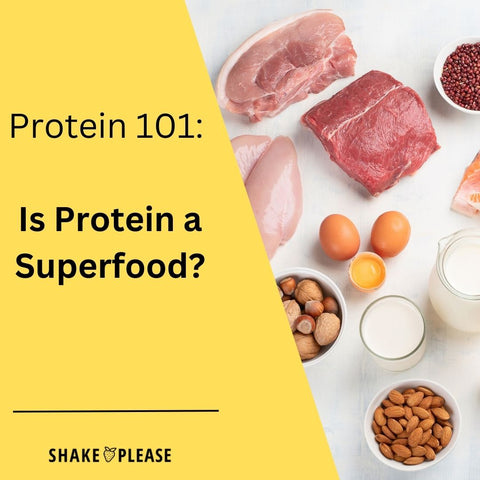
Protein, often being called a superfood has gained immense recognition as an indispensable nutrient to overall health and well-being.
Protein plays an essential role in how our body works while offering numerous health benefits.
In this article, we will examine proteins significance as an indispensable superfood: types, nutritional content, benefits, myths and best sources as well as potential impacts such as athletic performance enhancement and weight loss; best sources for vegetarians/vegans as well as recommended intake; risks/side effects considerations before concluding by summarizing its significance as such an incredible superfood!
Introduction
Protein is a macronutrient composed of amino acids - the building blocks of life.
Protein plays an integral part in tissue repair and maintenance as well as cell function, immune response and energy production processes in our bodies.
Athletes, fitness enthusiasts and those looking to lose weight often consume protein-rich diets.
Protein Superfood Smoothie
Looking for a delicious and nutritious way to fuel your body?
Look no further than protein superfood smoothies!
Packed with the goodness of protein-rich ingredients like whey protein and berries, these smoothies are a powerhouse of nutrients.
Not only do they provide a convenient and tasty way to increase your protein intake, but they also offer a wide array of health benefits.
From supporting muscle growth and repair to aiding in weight management and promoting overall well-being, protein superfood smoothies are a fantastic addition to your diet.
So, blend up your favorite combination of protein-packed ingredients and enjoy a scrumptious and wholesome treat that will keep you energized and satisfied throughout the day!
Importance of Protein
Protein is really important for keeping our body healthy. It helps our body fix damaged tissues, make enzymes and hormones, fight off germs, and even helps with things like balancing fluids, regulating pH levels, and moving nutrients around in our body.
Furthermore, protein plays a significant role in helping preserve lean muscle mass during periods of weight loss or physical activity.
Types of Protein
Protein can be obtained in various ways, from both animal- and plant-based sources.
Animal proteins like meat, poultry, fish eggs and dairy products contain all essential amino acids needed by our bodies whereas plant proteins like beans lentils peas nuts seeds tofu tempeh contain rich sources of protein but may lack one or more essential amino acids - although by eating a variety of plant sources we may still achieve an array of essential amino acid profiles.
It's essential that consumers select high quality sources as part of a balanced diet to stay healthy.
HIGH PROTEIN HEALTHY SMOOTHIES FOR A STRONGER YOU!
Nutritional Content of Protein
Protein provides not only amino acids, but also other essential nutrients.
It is an excellent source of B vitamins, vitamin D, iron, zinc magnesium and calcium - essential components in various physiological processes.
Protein also provides energy with 4 calories per gram making it an integral component of a balanced diet.
Benefits of Protein
Protein can provide many health advantages, with one primary advantage being muscle building and repair.
Protein provides essential amino acids needed for muscle repair and growth, making it essential for athletes, bodybuilders, and strength trainers.
Protein also assists weight management efforts by supporting satiety, decreasing appetite, increasing metabolism, and aiding weight loss efforts.
Furthermore, protein plays an essential role in overall health by aiding immune function as well as providing healthy hair, skin, nails, enzymes and hormones production in our bodies.
Myths about Protein
There are numerous misconceptions and myths surrounding protein that need to be disproved.
One such misperception suggests that high intakes can lead to kidney damage; this assertion has no scientific backing and should not be believed.
Protein consumed at recommended levels is safe for healthy individuals.
Another popular misperception suggests protein is only necessary for athletes or bodybuilders whereas it plays an essential role in overall health for everyone regardless of activity level.
Therefore it's crucial that we dispel such false impressions in order to gain clarity on its true benefits for overall wellbeing
Protein Is Key for Athletic Performance
Protein plays an essential part in athletic performance and should be highlighted when discussing sports nutrition.
Protein helps rebuild and repair damaged muscle tissue after intense physical exercise, aiding recovery and growth.
Furthermore, proteins support enzymes and hormones involved with energy production and muscle contraction; so athletes and active individuals alike should ensure adequate protein consumption to meet their training and performance goals.
Protein and it’s role in weight loss
Protein has been proven to increase satiety, curb appetite and boost metabolism - all factors which help with managing weight.
High-protein diets have been linked with better weight loss outcomes and body composition improvement compared to low-protein diets; protein helps preserve lean muscle mass during weight loss to support metabolic health while aiding metabolic wellbeing - so adding more protein-rich foods into one's daily diet could be invaluable for anyone attempting to shed extra pounds.
THE BENEFITS OF PROTEIN SMOOTHIE DELIVERY FOR A HEALTHY LIFESTYLE
Protein for Vegetarians and Vegans
Protein can often be an issue for vegetarians and vegans who do not consume animal-derived proteins, however it is possible to meet protein needs on a plant-based diet by including various plant-based protein sources like legumes, nuts, seeds, tofu, tempeh and plant-based protein powders as excellent choices.
It is essential to ensuring adequate consumption of essential amino acids by mixing different plant-based sources to achieve a comprehensive amino acid profile.
Protein Supplements
In recent years, protein powders and bars have grown increasingly popular as convenient methods of increasing protein consumption for those with busy lives or specific dietary restrictions.
While protein supplements may provide convenient ways of increasing intake, it should only ever replace whole food dietary choices in a balanced diet; choosing high quality options that do not contain added sugars and artificial ingredients are crucial considerations when using supplements as part of an overall plan.
Recommendations for Protein Intake
Protein consumption varies based on factors like age, sex, activity level and overall health status.
The Recommended Dietary Allowance (RDA) for protein is generally around 0.8 grams per kilogram of bodyweight per day; however athletes, older adults, pregnant and lactating women as well as individuals recovering from illness or injury may require higher amounts.
It is wise to consult a healthcare professional or registered dietitian when determining an individual's recommended daily protein consumption level.
Conclusion
Protein is an indispensable nutrient, essential to overall health and well-being, not just among athletes or bodybuilders but for everyone regardless of activity level or dietary preference.
Protein supports muscle repair and growth, immune function and production of enzymes and hormones in the body; furthermore it assists weight loss efforts, increases satiety levels and can be particularly helpful to vegetarians and vegans.
While supplements may seem convenient it's wise to prioritize whole food sources of protein while adhering to recommended intake guidelines for optimal health benefits.
Frequently Asked Questions (FAQs)
- Is Protein a Superfood? Protein is often considered a "superfood" due to its numerous health benefits, including supporting muscle growth, aiding in weight management, promoting immune function, and assisting with tissue repair and recovery.
- Are high amounts of protein safe to consume? Certainly. Consuming protein at recommended levels is safe for healthy individuals; however, to determine an individualized protein intake recommendation it is advisable to speak to a healthcare provider or registered dietitian first.
- Can protein assist with weight loss? Absolutely, protein can play an instrumental role in weight loss efforts by increasing satiety, decreasing appetite, and speeding metabolism. Studies have also linked high-protein diets with better weight loss results and enhanced body composition.
- Can vegetarians and vegans get enough protein from plant sources? Yes, vegetarians and vegans can meet their protein requirements on a plant-based diet by including various sources such as legumes, nuts, seeds, tofu, tempeh, plant protein powders etc. in their diet.
- How much protein should I consume daily? The appropriate daily protein consumption depends on factors like age, sex, activity level and overall health status. Therefore it is advisable to consult a healthcare professional or registered dietitian in order to ascertain an individualized protein requirement for yourself.
- Are Protein Supplements Necessary? Protein supplements such as protein superfood smoothies can be an easy and efficient way to increase protein consumption, but should never replace whole food sources of nutrition. When selecting high-quality supplements as part of an overall healthy diet plan.





